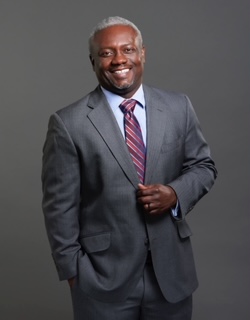Posted by jmeyer on November 17, 2022

“Boys are Brilliant,” is the phrase prominently featured on shirts worn by the boys and young men who participate in the Sims-Fayola Foundation’s mentoring program, and it is a statement that the staff and mentors believe and work to reinforce in the boys they work with every day. In the United States in 2010, 8% of Black students and more than 15% of Hispanic and Latino students between the ages of 16 and 24 did not have a high school education, according to the U.S. Census. Because of these racial disparities in education, the Sims-Fayola Foundation works with young men and boys of color from first grade through high school to combat these statistics. Founded as a non-profit in 2014 by Dedrick Sims, the Sims-Fayola Foundation works to change the conditions that have contributed to the barriers that young men of color face in achieving high school and college graduation.
Mentoring is a central part of the Sims-Fayola Foundation’s programming to help provide the young men and boys in their community with direction, educational guidance, and support. Not only will their mentoring programs help ensure the participating children reach their dreams and potential, but also help address systemic issues these children face. The Community Mentoring program matches mentors with one mentee each. Over the course of the 12 months they are matched, six sessions are carved out for curriculum-based meetings arranged by mentoring program staff. Another six sessions are open, fun, activity-based meetings held once a month on Saturdays. In the open sessions, all matches participate in activities as a group. Across all the activities in the mentoring program, the desired outcomes are to build leadership skills and character development, positive racial and ethnic identity, and social-emotional learning in mentees.
To obtain their objectives for both the organization and the individuals participating in the program, the Sims-Fayola Foundation needed a research-driven and strategic approach to mentoring. The future of the population they work with is too important to manage without proven programming and training. Mentoring Central’s mentor training programs were the ideal fit to ensure mentors received the best training currently available, and that their volunteers had a smooth and welcoming start into becoming a mentor in the program.
The Sims-Fayola Foundation aims to draw more young men and boys of color into leadership roles and activities in school and increase their self-awareness. During the pandemic, their work did not stop. The Sims-Fayola Foundation continued to engage mentors and mentees with online programming. This strategy proved to be both helpful and innovative as a new initiative. Maya Moorman, Mentor Coordinator at the Sims-Fayola Foundation, said transitioning to e-mentoring allowed them to continue their mission of providing one-to-one mentoring to youth during the pandemic and to continue to engage youth with other caring adults in their community. The e-mentoring program requires mentors to meet with mentees virtually twice a month to participate in conversations guided by the curriculum.

Dedrick Sims, an educator in Denver, founded the Sims-Fayola Foundation in his city, but the need and reach have grown. The Foundation now mentors and supports young men and boys of color in Colorado, Ohio, Michigan, Louisiana, Texas, Arkansas, Alabama, and Georgia. The next five years are important for the organization as they work to develop a comprehensive strategy. The need for streamlined and accessible training for both staff and mentors is tremendous as the growth and expansion of their program across the United States continues. Consistent training across mentors and staff ensures proper procedures are followed, problems are solved correctly and efficiently, and the best practices around mentoring are consistently followed.
The Sims-Fayola Foundation uses Mentoring Central’s Preparing for Mentoring Program to train mentors online. This comprehensive, online training program includes the three foundational courses for mentors: Building the Foundation, Ethics & Safety, and Building and Maintaining the Relationship. For their new e-mentors, the Foundation has also begun using Mentoring Central’s Building the Foundation for e-Mentoring course.

Every mentor is required to take the training to ensure they have realistic and positive expectations and the right attitude to begin mentoring. With a clear definition of what mentoring encompasses and the responsibilities of mentors, both mentors and mentees have better outcomes. Learning opportunities within the courses include understanding what motivates volunteers to become mentors, how to handle difficult situations, behaving in an ethical way that supports the safety of mentees, and strategies for building a trusting relationship with mentees.
The e-mentoring course trains mentors on how to conduct their role in an online platform and helps provide clear guidelines on unique boundaries e-mentors may face. Along with the other integral lessons, this training helps mentors navigate a new territory within the Sims-Fayola Foundation mentorship programs.
The Sims-Fayola Foundation’s mentoring program was developed after parents kept calling schools looking for a mentoring program for their school-aged boys in Denver, Colorado. Since its founding, the Foundation has impacted more than 10,000 young men and boys of color. The Mentoring Central trainings have helped to support many high-quality mentoring relationships. When mentoring across state lines and with thousands of people involved, consistency is imperative. Mentoring Central’s programs have provided this stability to allow for the continued, and growing, success of the Sims-Fayola Foundation.
With a common understanding and definition of mentoring, the Foundation has changed lives across the country. All the more, during the pandemic, the Sims-Fayola Foundation was able to pivot to a virtual mentoring program with the aid of Mentoring Central. Without this expeditious turnaround, dozens of young men and boys would have gone without guidance and support provided by mentors during one of the most challenging moments in modern history. Organizations around the U.S., such as the Sims-Fayola Foundation, have played an integral role in decreasing the high school dropout rate for Black students to about 4% nationwide. This rate has been cut approximately in half in the last decade. The same is true for Hispanic and Latino students.
Looking ahead, the Sims-Fayola Foundation will continue to support the brilliant boys and young men who participate in their programs. They have built a strong foundation by using Mentoring Central’s training programs and plan to continue to personalize their mentor training practices to best support their goals.

For more information about the Sims-Fayola Foundation:
3600 S Yosemite St, Denver, CO 80237
(720) 557-8443